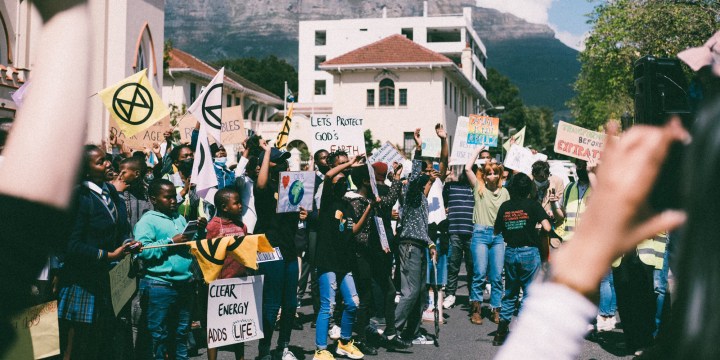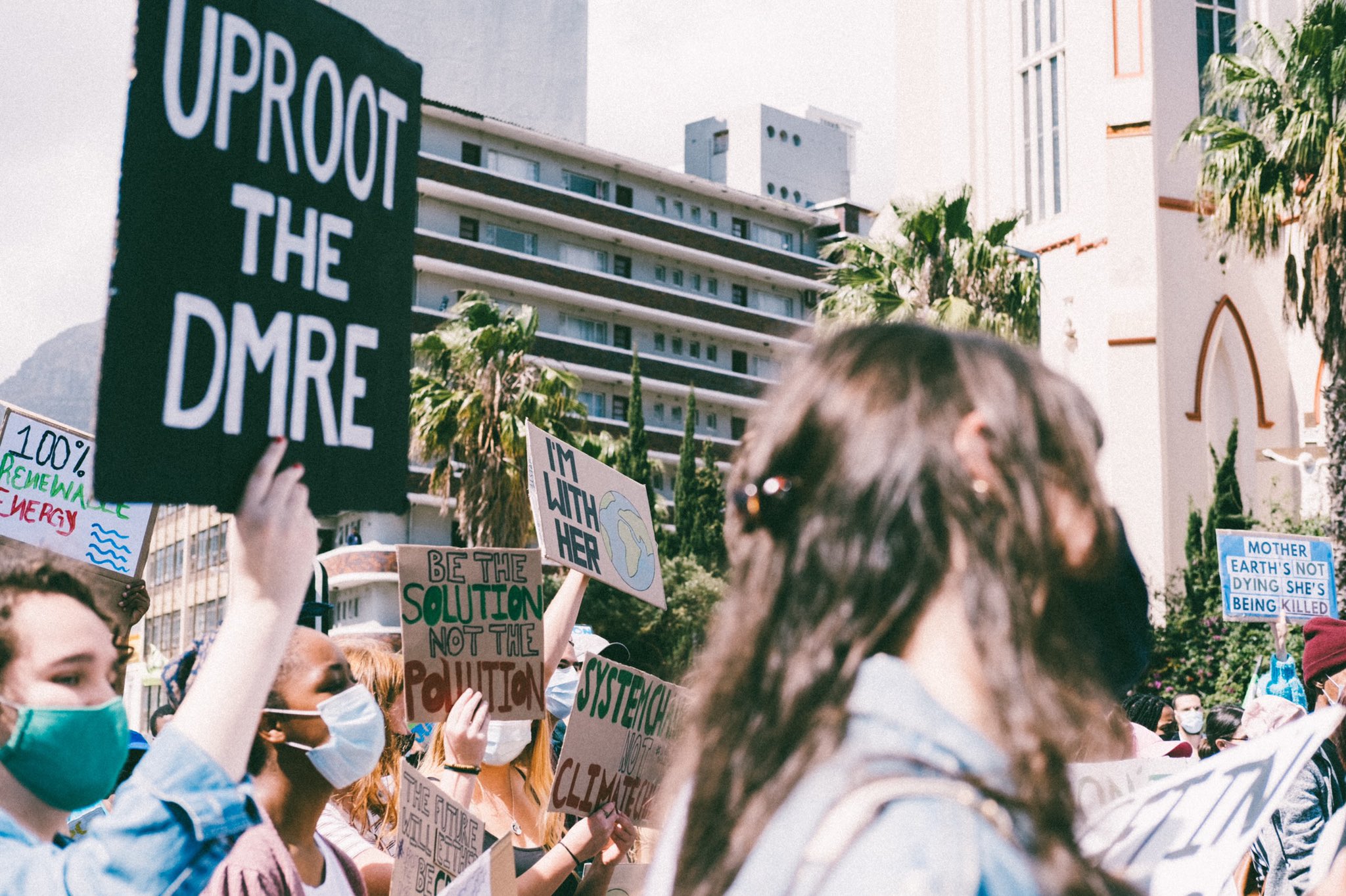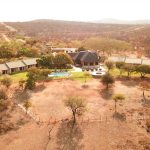OUR BURNING PLANET
South African protesters join global climate strike event

A group of South African participants in the Global Climate Strike 2021 event called for a change in leadership at the Department of Mineral Resources and Energy, arguing in particular that Minister Gwede Mantashe is a stumbling block to progressive climate action. Protesters also gathered to express a range of concerns under the umbrella of climate justice.
As the planet continues to heat up as a result of carbon emissions, activists are pressing leaders to take part in climate action and to realise the intersectionality of the crisis that climate change is producing.
Gathered in front of Parliament’s gates in Cape Town under the #UprootTheDMRE banner on Friday, 24 September 2021, more than 100 protesters held placards while demanding in song and chant that the minister of the Department of Mineral Resources and Energy (DMRE), Gwede Mantashe, must go.
The group gathered as part of the Global Climate Strike that was marked in more than 100 countries. The South African gathering consisted of mainly young people, with a few more elderly protesters who came to support the call for a better present and future.
Aviwe Ludzebe, 16, told Daily Maverick that she was protesting to demand that the government take the climate crisis seriously and act to bring an end to the mining of fossil fuels which results in the release of carbon emissions.
“I want our voices to be heard by those in power,” the learner said. “Those in power know about climate change, but they only care about money. [Action] like protesting, picketing, marching, shows them that we are serious about [the climate crisis] and we know the effects of climate change.
“Some people are getting ill, not knowing why they are getting ill. Some animals cannot adapt to the changed climate, and the government should take [the climate crisis] seriously.”
Transforming leadership

Youth climate activist Gabriel Klaasen and fellow activists call for the crowd to shout for an end to what climate activists have deemed a poor response in taking climate action. (Photo: James Granelli)
Climate activists have made strong calls for a transition to renewable energy forms such as solar, wind and hydropower. Mantashe has, however, been adamant that the transition from coal-fired energy will be a mix of nuclear, gas and renewable energy.
Daniel Robinson, manager for a climate change NGO, told Daily Maverick that it was important for him to strike alongside the youth he worked with. He believed that leadership in South Africa’s energy sector was poor and needed to change.
“We want change. We’re speaking about a system change… The leadership we have right now is looking backwards. Globally, the science is coming out and speaking to all the things that need changing. We need to lower our carbon footprint and Gwede Mantashe is not looking to do that. He’s speaking about new coal, clean coal, nuclear — that’s not where we want to go,” Robinson said.
Minister of the Department of Forestry, Fisheries and the Environment (DFFE) Barbara Creecy told a Presidential Climate Commission (PCC) webinar last month that reasons for South Africa’s slow adaptation response included a lack of global climate financing from the developed nations that had pledged to assist developing countries maintain their Paris Agreement commitments.
In the period 2008-2019, developed nations had contributed $1-billion a year to the efforts in the Southern African Development Community countries to tackle the climate crisis. This was despite their 2009 pledge to increase that figure to $100-billion per year by 2020. Recently, US President Joe Biden doubled the US individual climate finance pledge to developing countries, placing it at about $11-billion per year by 2024. At the PCC briefing, Creecy called for the developed nations to increase funding for developing nations to around $750-billion per year in order to meet climate action needs. Eskom’s just transition alone is expected to cost $10-billion.
Intersectional climate justice
Improved climate financing was also one of the key demands of the Global Climate Strike organisers. Alongside climate financing, protesters in many countries also called for climate justice from the global north in the form of debt cancellation, reparations for most affected areas and people, and emission cuts from the developed nations.
Eighteen-year-old intersectional activist Raeesah Noor-Mahomed said it was important that South Africans participate in the global strike to indicate that they cared about the global climate crisis while acknowledging that the crisis was going to affect each country differently.
In South Africa it was not just about the fact of changes to the climate, she said. “[It’s] not just the climate issue; it’s a social issue, it’s a human rights issue. The biggest thing is that not everyone will experience it the same way. Marginalised people will be much more disadvantaged by the climate crisis. Marginalised people have been the least contributors to the climate crisis,” the activist told Daily Maverick. “What we are calling for as a whole is social justice, because there cannot be climate justice without social justice,” Noor-Mahomed said.
Nick Ford, 18, who also attended the strike, told Daily Maverick that the concept of climate justice was becoming increasingly important as a counter to the existing climate change movement, as it recognised social blind spots in the climate crisis movement and ensured that activists would seek inclusive solutions to the crisis.

Protesters gather in Cape Town in front of Parliament to call for transformation in the leadership of the Department of Mineral Resources and Energy. (Photo: James Granelli)
“Climate justice has become an increasingly important and relevant term in the anti-climate change movement, and it broadly refers to ensuring that the fight against the climate crisis is considerate of and inclusive of people who fall on all economic and social intersections,” the learner said.
Among the demands from the local protesters was a call to enable socially owned renewable energy that would see workers, communities, small to medium businesses and families own and benefit from cleaner energy. Other demands included;
- A transformed DMRE leadership that would secure a socially, economically and ecologically just energy and mining future;
- A green new Eskom; and
- An end to corrupt and polluting new coal, gas or oil projects.
Class struggles and the climate crisis
Anela Jahmena, a singer in the music group Soundz of the South who was at the protest and also performed there, told Daily Maverick that her group’s music was about amplifying the voices of the working class. She said the music addressed issues such as the intersection of climate change and class struggles.
“Climate change is directly linked to the greed that capitalism has promoted and continues to promote,” she said. “Working-class people are the ones who are faced mainly by climate change because we come from informal settlements. When there’s floods in our communities, we lose our homes. When it’s very hot, we don’t know where to go because our homes are very hot. We live in zinc houses. We live in unstable conditions because of the extractions (of fossil fuels and natural resources) that are happening,” Jahmena said.
“I am here today because I believe that climate change is a working-class issue,” Zaghrah Benjamin told Daily Maverick, adding that Cape Town’s Day Zero drought was evidence of this.
“At the end of the day, it’s going to affect the working class the most. The working class is already suffering,” the 19-year-old student said.
A recent IPCC report flagged a code red for humanity, warning of an increase in extreme weather conditions due to increased carbon emissions, with rates being at their highest in the last two million years. South Africa’s geographic location places the country at high risk for continued intense weather conditions expected from the climate crisis.
Findings have also shown that South Africa is likely to experience water shortages and intense droughts that will result in food shortages. This will fuel South Africa’s food and nutrition crisis that has been exacerbated by the Covid-19 pandemic, particularly in marginalised communities.
Michael Wolf, Extinction Rebellion South Africa press coordinator, told Daily Maverick that with South Africa’s temperatures expected to increase at twice the global average, the effects would be devastating for vulnerable communities.
“In South Africa, most of our population lives under precarious circumstances and doesn’t have the resources to adequately prepare and respond to the extreme weather events we expect,” Wolf said. “Meanwhile, South Africa produces more greenhouse gases per capita than the world average and is the world’s 12th-highest emitter. We are busy digging our own grave.”
Karpowerships
In addition to being one of the top emitters globally, and the leading emitter on the continent, the completion of Eskom’s 4,764 MW Medupi plant means that SA will need 16 million more tonnes of coal per year. At the same time, Eskom is looking to secure a deal with KarpowerSA that it hopes will curb load shedding through its gas-to-power ships. The deal, worth more than R200-billion, has failed to secure environmental approval from the Department of Forestry, Fisheries and the Environment, but has been given the nod by the National Energy Regulator of South Africa. The company is appealing against the earlier decision by the DFFE.
“The Karpowerships will set us even further back in our fight for the planet. These will be detrimental to our environment,” said Pètra de Beer, 17, who was at the protest as an ambassador for the African Climate Alliance (ACA).
Ariane Jenssen, 87, told Daily Maverick she hoped that the Global Climate Strike would strengthen the call for climate action and bring an end to coal-powered energy and powerships. DM/OBP



















 Become an Insider
Become an Insider
Comments - Please login in order to comment.